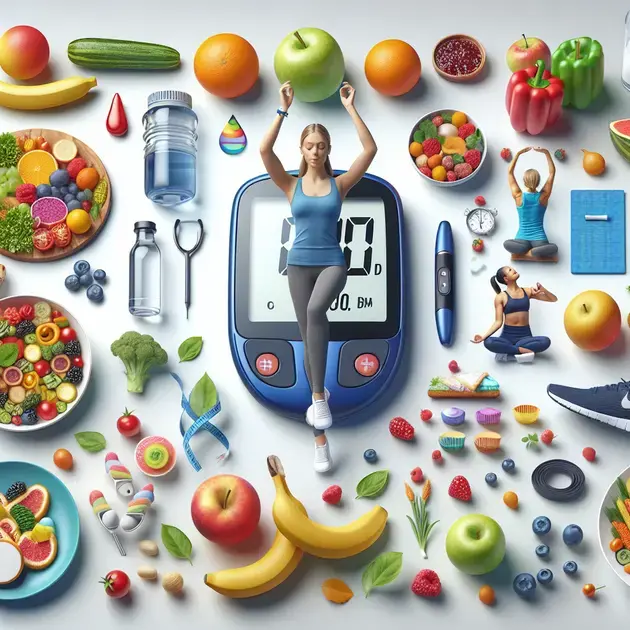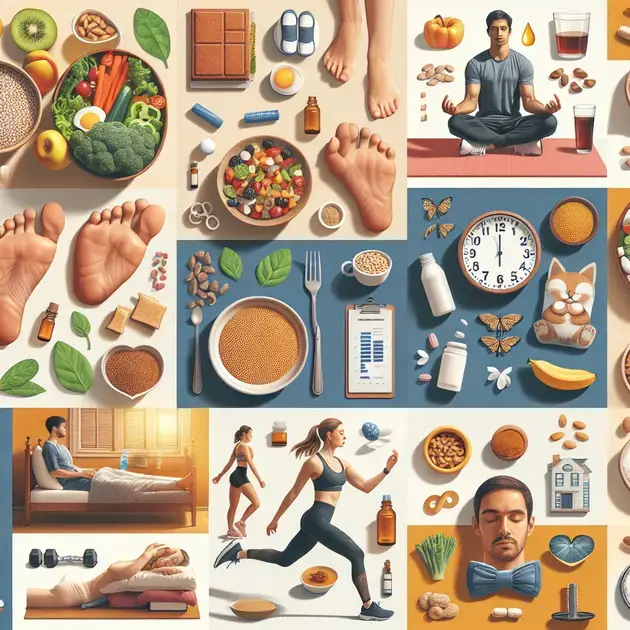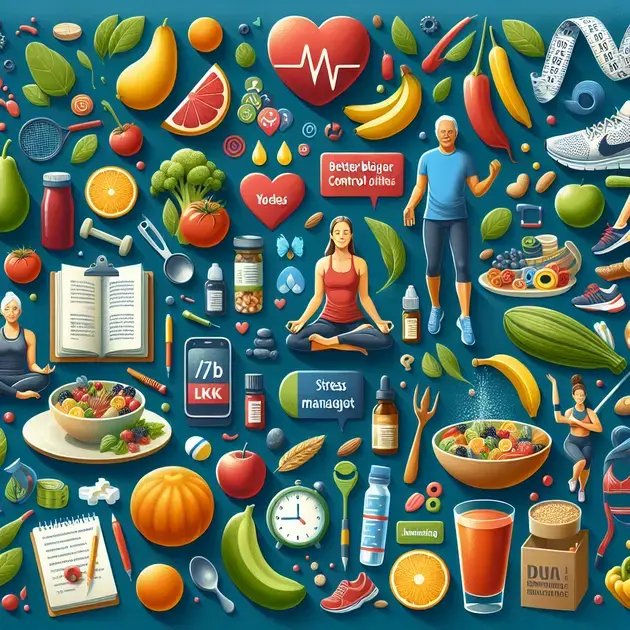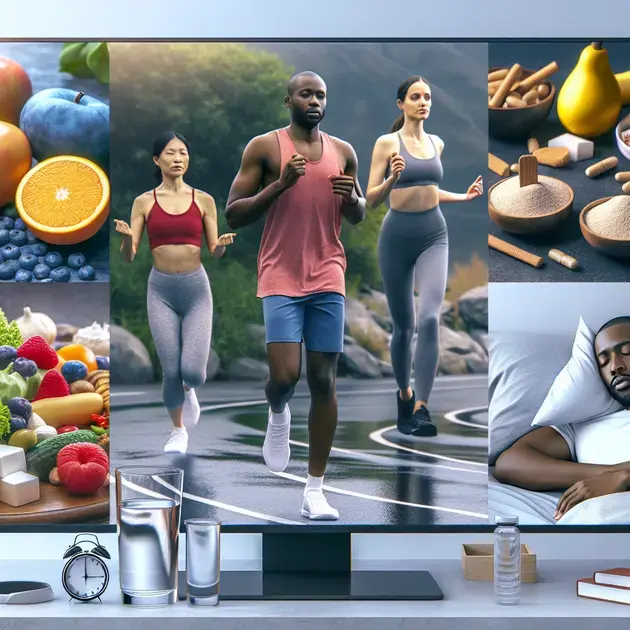Are you looking for effective ways to reduce your blood sugar levels? With the increasing prevalence of diabetes worldwide, managing blood sugar levels has become more important than ever. Luckily, there are several strategies you can implement to help keep your blood sugar levels stable and improve your overall health.
From making dietary changes to incorporating regular exercise into your routine, this post will explore some practical and evidence-based techniques to help you reduce your blood sugar levels effectively. By following these tips, you can take control of your health and reduce your risk of complications associated with high blood sugar.

Understanding the Impact of Diet on Blood Sugar Levels
When it comes to managing blood sugar levels, diet plays a crucial role. The food we consume directly affects our blood sugar levels and overall health. To understand the impact of diet on blood sugar levels, it is important to focus on consuming a balanced and nutritious diet.
One way to monitor the impact of diet on blood sugar levels is by using a blood glucose monitoring device or app, such as MySugr. This app allows users to track their food intake and see how it affects their blood sugar levels over time. By analyzing this data, individuals can make informed decisions about their diet and make necessary adjustments to maintain stable blood sugar levels.
In addition to monitoring food intake, it is important to pay attention to the glycemic index of foods. Foods with a high glycemic index can cause a rapid increase in blood sugar levels, while low glycemic index foods lead to a more steady rise. Apps like Glucose Buddy can help individuals identify the glycemic index of various foods and plan their meals accordingly.
Furthermore, incorporating a variety of nutrients in the diet, such as lean proteins, complex carbohydrates, and healthy fats, can help stabilize blood sugar levels. Apps like MyFitnessPal can assist in tracking nutrient intake and ensuring a well-rounded diet that promotes stable blood sugar levels.
In conclusion, understanding the impact of diet on blood sugar levels is essential for effectively managing diabetes and overall health. By using tools like blood glucose monitoring devices and apps that track food intake and nutrient content, individuals can make informed dietary choices to maintain stable blood sugar levels.
The Role of Exercise in Managing Blood Sugar Effectively
Exercise is another key factor in managing blood sugar levels effectively. Physical activity helps the body utilize insulin more efficiently and can lead to better blood sugar control. Incorporating regular exercise into a daily routine is crucial for individuals looking to maintain stable blood sugar levels.
One way to monitor the role of exercise in managing blood sugar levels is by using fitness tracking apps like Fitbit. These apps can track various types of physical activity, such as running, walking, or cycling, and provide insights into how exercise affects blood sugar levels.
In addition to tracking exercise, it is important to find activities that are enjoyable and sustainable. Apps like Strava can help individuals discover new ways to stay active and connect with a community of like-minded individuals who share their fitness goals.
Furthermore, incorporating both aerobic exercise and strength training into a workout routine can have a positive impact on blood sugar levels. Apps like Nike Training Club offer a variety of workouts that cater to different fitness levels and goals, making it easier for individuals to stay active and manage their blood sugar effectively.
In conclusion, exercise plays a crucial role in managing blood sugar levels effectively. By using fitness tracking apps and finding enjoyable ways to stay active, individuals can improve insulin sensitivity and overall blood sugar control for better health outcomes.
Practical Tips for Maintaining Stable Blood Sugar Levels
Maintaining stable blood sugar levels requires a combination of dietary choices, exercise, and lifestyle habits. Here are some practical tips to help you manage your blood sugar effectively:
1. Monitor Your Blood Sugar Levels Regularly
Use a blood glucose monitoring device or app to track your blood sugar levels throughout the day. Apps like Glooko can help you log and analyze your blood sugar readings, providing valuable insights into how your body responds to different foods and activities.
2. Eat Balanced Meals and Snacks
Focus on consuming a balanced diet that includes a mix of carbohydrates, proteins, and fats. Apps like CalorieKing can help you track your food intake and ensure you are making healthy choices that promote stable blood sugar levels.
3. Stay Active Throughout the Day
Find opportunities to incorporate physical activity into your daily routine, such as taking the stairs instead of the elevator or going for a brisk walk after meals. Apps like FitOn offer quick and effective workouts that you can do at home to stay active and manage your blood sugar levels.
4. Get Adequate Sleep
Poor sleep can affect blood sugar levels and insulin sensitivity. Use apps like Sleep Cycle to track your sleep patterns and ensure you are getting enough restful sleep each night for better blood sugar control.
5. Manage Stress Levels
High levels of stress can lead to fluctuations in blood sugar levels. Practice relaxation techniques, such as meditation or deep breathing, and use apps like Headspace to help you reduce stress and maintain stable blood sugar levels.
By following these practical tips and incorporating technology tools into your daily routine, you can effectively maintain stable blood sugar levels and improve your overall health and well-being.

Effective Ways to Control Blood Sugar Levels Naturally
Controlling blood sugar levels is crucial for overall health and well-being. By incorporating natural methods, you can effectively manage your blood sugar levels without relying solely on medication. Here are some effective ways to control blood sugar levels naturally:
1. Maintain a Healthy Diet
One of the most important ways to control blood sugar levels is to follow a healthy diet. Focus on consuming whole foods such as fruits, vegetables, whole grains, and lean proteins. Avoid processed foods and sugary drinks, as they can cause spikes in blood sugar levels.
2. Stay Active
Regular exercise plays a significant role in regulating blood sugar levels. Aim to incorporate at least 30 minutes of physical activity into your daily routine. Activities such as walking, jogging, or strength training can help improve insulin sensitivity and lower blood sugar levels.
3. Monitor Your Blood Sugar Levels
Frequent monitoring of your blood sugar levels is essential for understanding how your body responds to different foods and activities. Keep track of your levels throughout the day and make adjustments to your lifestyle as needed.
4. Stay Hydrated
Proper hydration is key to maintaining healthy blood sugar levels. Drinking an adequate amount of water helps your body flush out excess sugar and improve overall hydration. Aim to drink at least 8-10 glasses of water daily.
5. Get Sufficient Sleep
Lack of sleep can negatively impact blood sugar levels and insulin sensitivity. Aim to get 7-8 hours of quality sleep each night to support overall health and proper blood sugar regulation.
The Importance of Proper Hydration for Blood Sugar Regulation
Proper hydration plays a crucial role in regulating blood sugar levels and overall health. When it comes to controlling blood sugar, staying adequately hydrated can make a significant difference. Here are some important factors to consider:
1. Water and Blood Sugar
Water helps maintain proper blood volume and circulation, which is essential for transporting glucose to cells for energy. Dehydration can lead to increased blood sugar levels, so staying hydrated is key to supporting healthy blood sugar regulation.
2. Hydration and Insulin Sensitivity
Proper hydration supports insulin sensitivity, allowing cells to effectively respond to insulin and regulate blood sugar levels. When you are dehydrated, your body may have trouble utilizing insulin, leading to fluctuations in blood sugar.
3. Tips for Proper Hydration
To ensure you stay hydrated for optimal blood sugar regulation, consider carrying a reusable water bottle with you throughout the day. Aim to drink water consistently, especially before and after meals. Avoid sugary beverages, as they can have negative effects on blood sugar levels.
4. Signs of Dehydration
It’s essential to recognize the signs of dehydration, such as dark urine, dry mouth, and fatigue. By staying vigilant about your hydration levels, you can support your body’s ability to maintain stable blood sugar levels.
5. Making Hydration a Priority
By making hydration a priority in your daily routine, you can support overall health and effectively regulate blood sugar levels. Consistent hydration, along with a balanced diet and regular exercise, can contribute to better blood sugar management and improved well-being.
Exploring Holistic Approaches to Balancing Blood Sugar Levels
When it comes to balancing blood sugar levels, holistic approaches encompass a variety of methods that focus on the overall well-being of an individual. By exploring holistic practices, you can address the root causes of blood sugar imbalances and promote long-term health. Here are some holistic approaches to consider:
1. Mind-Body Connection
Practicing mindfulness techniques such as meditation, yoga, or deep breathing exercises can help reduce stress levels and support healthy blood sugar regulation. Stress management is crucial in maintaining balanced blood sugar levels.
2. Herbal Remedies
Certain herbs and supplements have been shown to support blood sugar control, such as cinnamon, fenugreek, and bitter melon. Incorporating these natural remedies into your routine may help promote better blood sugar balance.
3. Acupuncture and Traditional Chinese Medicine
Acupuncture and traditional Chinese medicine focus on restoring balance and harmony within the body. These practices can help regulate energy flow and support overall health, including blood sugar regulation.
4. Lifestyle Modifications
Adopting a holistic approach to balancing blood sugar levels involves making sustainable lifestyle changes, such as getting regular exercise, prioritizing sleep, and practicing mindful eating. These modifications can have a positive impact on blood sugar control.
5. Individualized Treatment Plans
Consulting with a healthcare provider or holistic practitioner can help you create a personalized treatment plan that addresses your unique needs and goals for blood sugar management. By taking a holistic approach, you can empower yourself to achieve optimal blood sugar balance and enhance your overall well-being.
Conclusion
Controlling blood sugar levels naturally is essential for overall health and well-being. By incorporating methods such as maintaining a healthy diet, staying active, monitoring blood sugar levels, staying hydrated, and getting sufficient sleep, individuals can effectively manage their blood sugar without relying solely on medication.
Proper hydration plays a vital role in regulating blood sugar levels and overall health. Water helps maintain blood volume and glucose transport, while dehydration can lead to increased blood sugar levels. Supporting insulin sensitivity through hydration is crucial for stable blood sugar regulation.
Exploring holistic approaches like mindfulness practices, herbal remedies, acupuncture, lifestyle modifications, and personalized treatment plans can address the root causes of blood sugar imbalances. By making holistic practices a part of daily routines, individuals can empower themselves to achieve optimal blood sugar balance and enhance overall well-being.

















